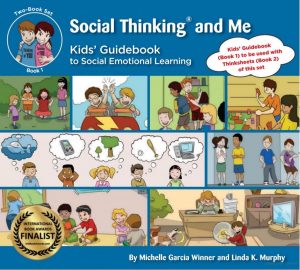Social Thinking Learning: Chapter 2, Flexible Thinking
We are continuing our work in the book
Social Thinking and Me.
Chapter 2 is on Flexible Thinking!
Last time we talked about social thinking, and how learning to behave and having maturity in situations can help us to be more included in a group. Thank you to everyone for coming up with some excellent reasons to develop social thinking skills! Great work!
Now, we are talking about flexible thinking. Flexible thinking means thinking in different ways about social situations and noticing how others many think about the situation (their perspectives). When we think in a flexible way in a group, it means we can stay calm and try to figure out social situations in positive ways.
For example, people can do things you may not immediately understand. If you are flexible, you can understand sometimes people do things without any malicious or mean intent. Sometimes people’s behaviours have NOTHING to do with you.
Being flexible means you try to figure out how to be with others without always wanting to get your own way. Take turns, share, and be open to not always being first, right, or the one who gets to do everything. GROUP THINK not SOLO THINK.
Being flexible means you think about what’s best for you AND those around you. You are not alone, and there is a bigger group to consider. If you want to be included, you need to think about the needs of other people in the group.
Being flexible means trying to take a few extra moments to figure out what other people are doing or saying and why they might be doing or saying it. For example, maybe what the words they are saying don’t mean exactly one thing. If I say I woke up on the wrong side of the bed, it doesn’t mean I was on the wrong side! It means, I woke up in a grumpy mood. Sometimes the schedule changes. We can be open to CHANGE and know not everything will always go according to routine, and there may be some good reasons why!
It is expected we are flexible with other people. We did a survey in class, and everyone agreed — we all prefer to work and to play with people who compromise, who don’t always want to have their way, who listen, who are open to change, who don’t argue as much, and who don’t immediately assume the worst from every behaviour that happens.
When we are not being flexible, we are doing stuck thinking, which can make us feel frustrated and stressed, and can make those around us feel negative things, too.
We can think with our eyes to find social cues/clues in situations, and to consider the thoughts and feelings of people around us.
When we are more flexible with our friends, teachers, and parents, it helps them feel safe, relaxed, less stressed, and happy. When these people have good thoughts about me because I am flexible, they usually have good thoughts about me and will treat me well.
At home, can you talk more about these ideas? Talk about some times people in the family have used flexible or stuck thinking. Start identifying it when it happens. We started doing this in class today!

